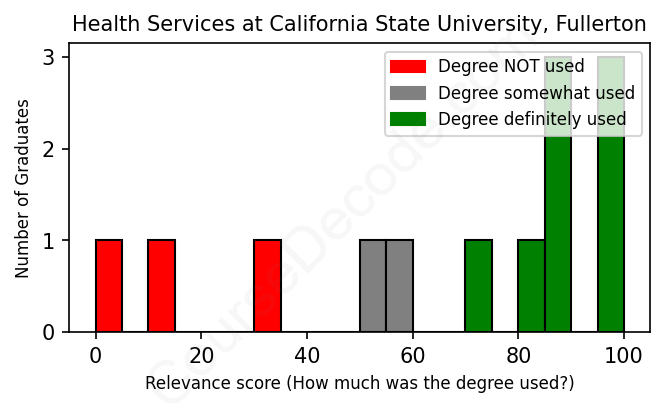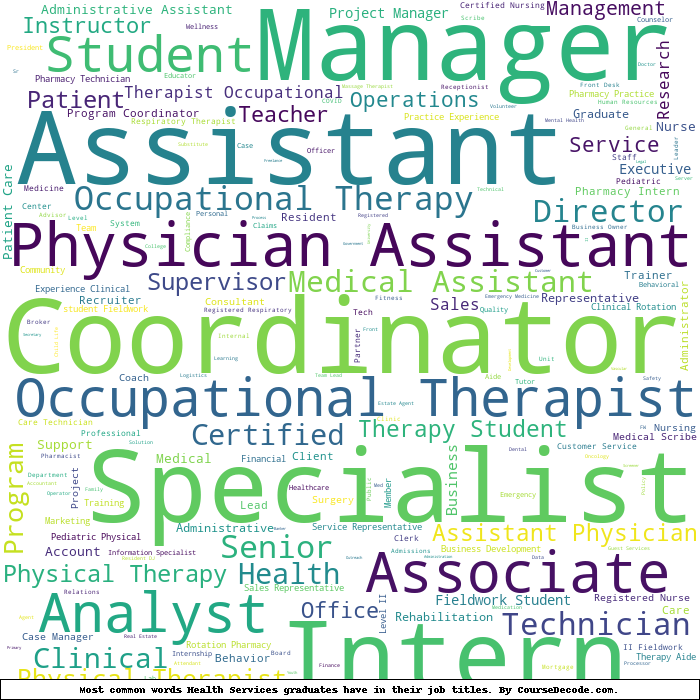
First, some facts. Of the Health Services graduates from California State University, Fullerton we've analyzed , here's how many have used (or NOT used) their degree in their career:

These are estimates based on AI analysis of 13 LinkedIn profiles (see below).
The verdict? Slightly below average. Overall, with an average relevance score of 66%, Health Services graduates from California State University, Fullerton have a slightly lower likelihood (-1%) of finding work in this field compared to the average graduate across all fields:
And for comparison, here's the chart for all profiles we've looked at across all degrees.
Also, after graduating, only 30% of these graduates have pursued further education other than another Bachelor's degree (such as a Masters degree or other), compared to the average across all profiles of 35%. This suggests a Bachelors degree is enough for most Health Services graduates, and it's normal to look for work straight after graduation.
See the details:
|
Relevance score: 89% We think this person has gone into a career highly relevant to their degree. We think this person has gone into a career highly relevant to their degree.
DEGREE INFOGraduated in 2013 from California State University, Fullerton with a Bachelor's degree in Health Services. Also pursued further education since (see below). JOB HISTORY SINCE GRADUATIONCNA Children's Hospital Colorado Jan 2016 - Oct 2017 Labor and Delivery Nurse  Rose Medical Center Mar 2018 - Present FURTHER DEGREES DONE SINCE GRADUATINGUnknown degreeDenver School of Nursing 2016 - 2017 ABOUTNo information provided. |
The top 10 most common jobs done by the graduates we've analyzed (ranked most common to least) are:
When looking at the job paths of graduates from California State University, Fullerton's Health Services program, we see a mix of positions that range significantly in relevance to their degree. Some of the most common jobs include roles like Certified Occupational Therapy Assistant, Emergency Medical Technicians, and various nursing positions, which are highly related to health services as they utilize the specific knowledge and skills gained from their education. On the flip side, many graduates have ventured into jobs like personal bankers, photographers, and executive assistants where their degree doesn't directly apply, showing a broad range of career choices that stray from the health services field.
Overall, while it's great to see some alumni landing roles that are directly aligned with their studies and contributing to the healthcare sector, a noticeable portion of the jobs taken up by these graduates isn't health-related. This suggests that while the Health Services degree equips students with valuable skills, the job market allows for diverse career trajectories that may not necessarily utilize those skills in a direct manner.
Here is a visual representation of the most common words in job titles for Health Services graduates (this is across all Health Services graduates we've analyzed, not just those who went to California State University, Fullerton):

Graduates of California State University, Fullerton with degrees in Health Services seem to have a mixed bag of career trajectories. For many, their first jobs after graduation lean towards positions that are directly related to health services, such as Certified Nursing Assistants, Emergency Medical Technicians, and various healthcare aides, which is promising. There are also a few who have taken a different route, like the Personal Banker or Freelance Photographer, which suggests that not all graduates stick strictly to health services roles. But on the whole, it looks like those who pursued health-related jobs right after college are generally on a positive track, progressing to roles like nurses, certified occupational therapy assistants, and clinical directors. That said, some paths seem to diverge significantly from healthcare over time, with individuals moving into marketing, administrative, and even completely unrelated fields.
As we look at individuals who are five to ten years post-graduation, there’s a noticeable trend where those who started in health services roles continue to build their careers in various healthcare settings, often moving into more responsible positions like clinical directors or behavior therapists, which bodes well for the program and indicates solid job growth in the field. However, the alumni who shifted to non-health roles, like product management or photography, show a bit of a divide. While it's great that graduates can find success in diverse fields, it does highlight that some individuals may not stay true to their health services roots, which can be a concern if you're looking to ensure a career focused on health. Overall, there seems to be a healthy mix, but if your goal is a career in health services, you should definitely aim to get that relevant experience early on!
The Bachelor degree in Health Services at California State University, Fullerton, like many health-related programs, can be a bit of a mixed bag. It's not necessarily the hardest degree out there, but it does require a solid grasp of subjects like public health, health policy, and even some statistics. If you’ve got good study habits and a genuine interest in the field, you might find it manageable. On the flip side, if you're not super into the coursework or struggle with science and math, it could feel a bit challenging. Overall, I'd say it's about average in terms of difficulty—it definitely has its tough spots, but with the right mindset, it’s definitely doable!
Most commonly, in the LinkedIn profiles we've looked at, it takes people 5 years to finish a Bachelor degree in Health Services.
So, looking at this list of graduates from California State University, Fullerton, it seems like their earnings have been pretty mixed, depending on their career paths. The health services folks generally seem to have solid jobs that can pay decently, especially the labor and delivery nurse and the certified occupational therapy assistant, who typically make good wages. On the other hand, some of the graduates who went into photography or personal assistant roles might not be raking in the big bucks, at least initially. Those in roles like product management or clinical coordination seem to be on a more lucrative track too, but overall, it looks like there’s a decent range in terms of earnings potential depending on the field they chose. So, while some are likely making a solid living, others may still be figuring it out!
Here is a visual representation of the most common words seen in the "about" section of LinkedIn profiles who have a Bachelor degree in Health Services (this is across all Health Services graduates we've analyzed, not just those who went to California State University, Fullerton). This may or may not be useful:

Here are all colleges offering a Bachelor degree in Health Services (ordered by the average relevance score of their Health Services graduates, best to worst) where we have analyzed at least 10 of their graduates:
| College | Score | Count |
|---|---|---|
 The Ohio State University The Ohio State University
|
88 | 14 |
 Quinnipiac University Quinnipiac University
|
88 | 10 |
 Grand Valley State University Grand Valley State University
|
87 | 16 |
 University of Tampa University of Tampa
|
87 | 10 |
 Stony Brook University Stony Brook University
|
80 | 15 |
 Boston University Boston University
|
79 | 12 |
 University of Connecticut University of Connecticut
|
78 | 26 |
 Florida Agricultural and Mechanical University Florida Agricultural and Mechanical University
|
76 | 12 |
 Texas A&M University Texas A&M University
|
72 | 16 |
 University of South Florida University of South Florida
|
72 | 26 |
 Boise State University Boise State University
|
71 | 11 |
 University of Central Florida University of Central Florida
|
68 | 47 |
 Florida Gulf Coast University Florida Gulf Coast University
|
68 | 10 |
 James Madison University James Madison University
|
66 | 26 |
 University of Missouri-Columbia University of Missouri-Columbia
|
66 | 17 |
 California State University, Fullerton California State University, Fullerton
|
66 | 13 |
 California State University - East Bay California State University - East Bay
|
66 | 10 |
 Arizona State University Arizona State University
|
62 | 10 |
 Cleveland State University Cleveland State University
|
60 | 10 |
 Stockton University Stockton University
|
58 | 12 |